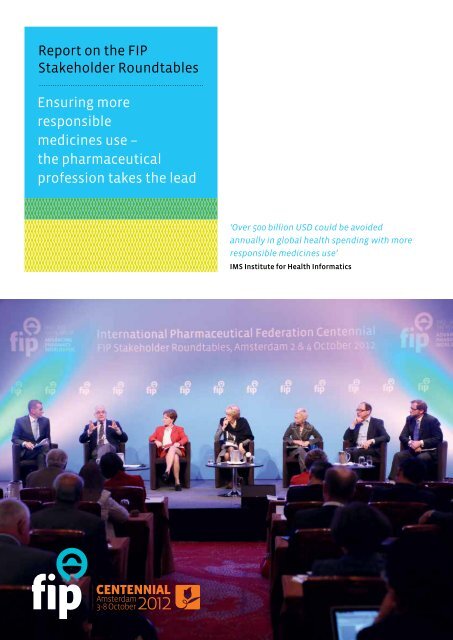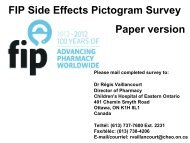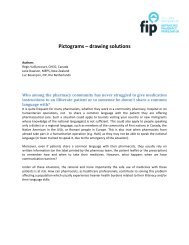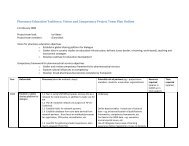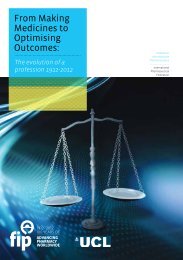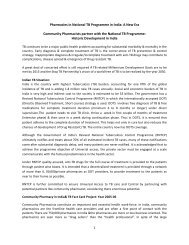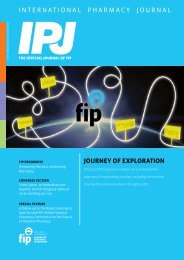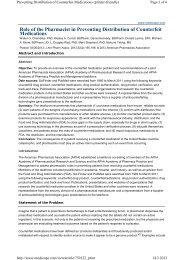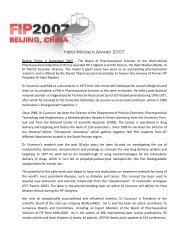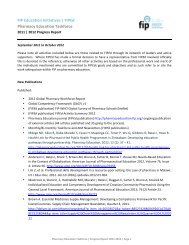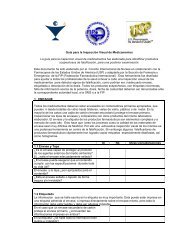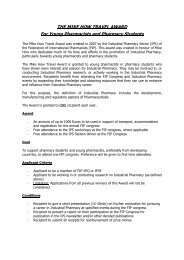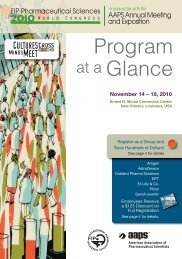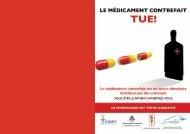here - FIP
here - FIP
here - FIP
You also want an ePaper? Increase the reach of your titles
YUMPU automatically turns print PDFs into web optimized ePapers that Google loves.
Report on the <strong>FIP</strong><br />
Stakeholder Roundtables<br />
Ensuring more<br />
responsible<br />
medicines use –<br />
the pharmaceutical<br />
profession takes the lead<br />
‘Over 500 billion USD could be avoided<br />
annually in global health spending with more<br />
responsible medicines use’<br />
IMS Institute for Health Informatics
RepoRt on the FIp StakeholdeR RoundtableS<br />
enSuRIng moRe ReSponSIble medIcIneS uSe–<br />
the phaRmaceutIcal pRoFeSSIon takeS the lead<br />
Held in Amsterdam, the Netherlands<br />
on 2&4 October 2012<br />
Providing solutions to the Ministers Summit on “The Benefits of Responsible Use of Medicines –<br />
Setting policies for better and cost-effective healthcare”<br />
The views expressed in this publication do not necessarily reflect those of the International<br />
Pharmaceutical Federation (<strong>FIP</strong>).<br />
International Pharmaceutical Federation (<strong>FIP</strong>)<br />
PO Box 84200<br />
2508 AE The Hague<br />
The Netherlands<br />
www.fip.org<br />
fip@fip.org<br />
Copyright © 2013 International Pharmaceutical Federation (<strong>FIP</strong>)<br />
All rights reserved. No part of this publication may be stored in any retrieval system or transcribed by any form or means – electronic, mechanical,<br />
recording, or otherwise without citation of the source.<br />
3
4<br />
contentS<br />
• Foreword<br />
• Executive Summary<br />
• The Right Medicine to the Right Patient<br />
• The Opportunity from Better Ad<strong>here</strong>nce<br />
• The Transformative Power of Shared Information within Healthcare systems<br />
• The Impact of Innovation<br />
• Acknowledgements<br />
• Contributors<br />
• Further Information<br />
05<br />
06<br />
11<br />
15<br />
19<br />
23<br />
27<br />
27<br />
30
FoRewoRd<br />
On the occasion of the International Pharmaceutical Federation’s (<strong>FIP</strong>) 100 th year anniversary, the <strong>FIP</strong> annual<br />
world congress brought together over 5000 pharmacists, scientists, academics and researchers. T<strong>here</strong><br />
participants from over 100 countries came to <strong>FIP</strong>’s home country of the Netherlands to celebrate <strong>FIP</strong>’s vast, rich<br />
history and launch the Federation and the profession into a new era.<br />
The <strong>FIP</strong> Centennial offered the opportunity for key events in global healthcare policy development. A Ministers<br />
Summit on the theme ‘The benefits of the responsible use of medicines. Setting policies for better and costeffective<br />
healthcare’ was organised by the Dutch Ministry of Health, Welfare and Sport. As part of informing<br />
this Ministers Summit, <strong>FIP</strong> convened a series of invitation-only Stakeholders Roundtables, w<strong>here</strong> healthcare<br />
professionals, scientific, governmental, patients and industry leaders, among others, discussed solutions<br />
towards the responsible use of medicines, in the context of optimising the use of limited resources.<br />
With over 200 invited guests and speakers, the <strong>FIP</strong> Stakeholder Roundtables highlighted the need for countries<br />
to recognise and utilise the untapped potential of pharmacists around the world. Pharmacists are confident<br />
in the future and are committed to contribute to the responsible use of medicines. As such, the Centennial<br />
Congress was also chosen as the venue to release one of <strong>FIP</strong>’s most important documents to date - the<br />
Centennial Declaration. The declaration, was unanimously adopted and signed by all present <strong>FIP</strong> Member<br />
Organisations, and signifies our joint, professional commitment to increasing responsible use of medicines<br />
globally.<br />
In this demanding era that we are experiencing, we must dare to advance. We must be creative, and willing to<br />
try new approaches. We can no longer consider medicines solely based on their price, but on the benefits that<br />
medicines and their responsible use can bring to health; we must embrace a shared vision to shift away from<br />
short-term gains and move towards longer-term, integrated and more effective policies, which consider the real<br />
and full range of the costs and benefits of medicines, from their invention to their responsible use and impact<br />
on health.<br />
The International Pharmaceutical Federation is proud of its global role in Improving Health through the<br />
Responsible Use of Medicines. <strong>FIP</strong> will continue its engagement in partnership with other stakeholders and,<br />
as a follow-up of the 2012 Ministers Summit, the Ministry of Health of the Republic of Ireland and <strong>FIP</strong> will be<br />
organising a First Global Forum for Chief Pharmacists prior to the 2013 <strong>FIP</strong> congress in Dublin.<br />
Michel Buchmann, PhD<br />
<strong>FIP</strong> President 2010-2014<br />
5
6<br />
executIve SummaRy<br />
Harvey Fineberg (President, Institute of Medicine, USA)<br />
“The responsible use of medicine has implications throughout<br />
the healthcare system. Success will depend fundamentally on<br />
aligning and bringing together the interests and capacities that are<br />
represented in all stakeholder sectors.”<br />
Kris Weerasuriya (Department of Essential Medicines and Health Products, World<br />
Health Organization, Switzerland)<br />
“Universal health coverage is an important factor to achieve<br />
responsible use of medicines. Within a comprehensive healthcare<br />
system, pharmacists are not simply dispensers but responsible<br />
members who can guide us on aspects related to medicine. The<br />
journey towards universal health coverage and responsible use of<br />
medicines can result in better health and also efficiency savings<br />
needed in healthcare systems that have limited resources.”<br />
Murray Aitken (Executive Director, IMS Institute for Healthcare Informatics, UK)<br />
“The economic consequences of medicines not being used<br />
responsibly was estimated in the IMS report to cost our global<br />
healthcare budgets 500 billion USD annually. T<strong>here</strong> is good<br />
information and good examples of progress in countries around<br />
the world on how medicines can be used responsibly. Change is<br />
possible and outcomes can be improved for the sake of our health<br />
and our health economies.”<br />
Bert Leufkens (WHO Collaborating Centre for Pharmacoepidemiology and<br />
Pharmaceutical Policy Analysis, the Netherlands)<br />
“The Ministers Summit and Roundtables are positive and have<br />
confirmed that pharmacists have a very valuable role and<br />
opportunity to innovate and impact on the responsible use of<br />
medicines, as part of the healthcare team that surrounds and<br />
supports the patient.”
The <strong>FIP</strong> Stakeholder Roundtables brought together over 200 influential stakeholders from around the world<br />
and across sectors to discuss current and relevant issues facing the development and delivery of healthcare<br />
now and in the coming era. The rich and full discussion of the stakeholder roundtables were informed by<br />
two technical reports prepared by the World Health Organization (WHO) and by the IMS Institute for Health<br />
Informatics. With the conclusions of the first three the roundtables being presented during a special hearing<br />
of the Ministers Summit on ‘The responsible use of medicines. Setting policies for better and cost-effective<br />
healthcare’ on 3 October.<br />
The discussions included perspectives from leaders in government, industry, philanthropic, non-governmental<br />
and patient associations. These several perspectives emphasized a central point: the responsible use<br />
of medicine will not emerge from any isolated single sector taking the initiative; rather, it will depend<br />
fundamentally on aligning and bringing together the interests and capacities that are represented in all of<br />
those stakeholder sectors.<br />
Three key motivations for improving the responsible use of medicines were highlighted:<br />
1. The lack of responsible use of medicines wastes a huge amount of money. The IMS conservatively<br />
estimates this loss at USD 500 billion per year. The waste manifests not in medicines per se. Rather, the<br />
waste engendered by the lack of responsible use of medicines occurs throughout the healthcare system<br />
and beyond. From a budgetary point of view, programs to foster the responsible use of medicine are both<br />
a medication-related expense and a lever to amplify additional savings in other healthcare costs.<br />
2. T<strong>here</strong> is an enormous opportunity to regain savings, to achieve efficiencies, and to leverage healthcare<br />
system expenses, as well as performance, through more responsible use of medication.<br />
3. A central opportunity lies in making better use of the full capacity of human resources available to<br />
achieve responsible use of medication, particularly the skills, capacities and professional experience of<br />
the pharmacist who can play a much more active role in countries around the world in enhancing the<br />
performance of medications, the performance of medical care overall, and the experience of patients.<br />
The discussions emphasized four elements to strengthen systems capability for responsible medicines use that<br />
resonate with the elements and principles from the background technical reports produced by WHO and IMS.<br />
1. Patient-focused partnerships are important in order to achieve better healthcare, through engaging<br />
clinicians, pharmacists, patients, families, and communities in achieving the goals of responsible use of<br />
medication and better performance of care. This touches on both continuity of care and patient-centred<br />
care w<strong>here</strong> t<strong>here</strong> are collective roles, responsibilities and duties for shared decision- making.<br />
2. Through policy levers and practice, we need to realign the stakeholders--including those from industry,<br />
7
8<br />
the patient community, the professional community, and the payer community-- to meet patient needs,<br />
ensure seamless care, and achieve common goals of responsible use of medicines.<br />
3. To rely on evidence and better information to achieve more informed, timely and appropriate decisions,<br />
including evaluative information and obtaining feedback from the patient, provider and systems levels<br />
to improve performance over time.<br />
4. T<strong>here</strong> is a need for sustained leadership and political commitment in order to achieve many of these<br />
changes. Each country is different unto itself and yet each has lessons to learn from one to the other.<br />
In no country will these improvements be achieved by themselves; rather, they will require leadership,<br />
concerted effort, political mobilisation and a sustained commitment to make the necessary changes.<br />
Policy, resources and sustained policy action and implementation are needed that engage key decision<br />
makers (including Ministries of Education, Ministries of Finance and Ministries of Health) to drive and<br />
coordinate the responsible use of medicines agenda.<br />
The first roundtable dealt with the right medicine to the right patient.<br />
1. If we want to achieve the right medicine to the right patient at the right time delivered in the right<br />
way we have to do a better job of utilising the full capacity of the entire workforce. Utilisation of the<br />
workforce includes making better use of pharmacy capacity and pharmacists’ ability to provide direct<br />
support to patients to enhance their responsible use of medicine.<br />
2. Focus on the high return targets, as summarised in the IMS technical report. These targets include<br />
management of chronic disease to reduce reliance on polypharmacy, focussing on the more appropriate<br />
use of antimicrobials, and enhancing the safety of medication use.<br />
3. Embed strategies in a more systems-based approach to achieve the proper use of medication. This<br />
approach requires an integrated team-based strategy, a system of information, and a system of clinical<br />
care that provides the right setting to enable patients to get the right medicine in the right time in the<br />
right way.<br />
The second roundtable focussed on the enormous challenge of ad<strong>here</strong>nce. This challenge alone accounted for<br />
more than half of the projected potential savings in the IMS technical report.<br />
1. Success can follow from a more integrated healthcare approach that focuses on the needs of the<br />
patient. In this system, the use of medication is only one part of the total support of patient needs, so<br />
that follow-up is done in patients’ homes and the community, and the management of patients for their<br />
total condition. In addition, it can naturally incorporate attention and improvement through many case<br />
examples of the use of medicine and ad<strong>here</strong>nce to prescribed medication.
2. Reimbursement and financial policies can be used to foster the kind of integrated care and the<br />
opportunity to spend the necessary time with patients to educate and reinforce the need for use of<br />
medicine in the right way. However, this will only work if the policies are aligned with proper decision<br />
making.<br />
3. We must have a much richer understanding of patient needs from their point of view, the psychology of<br />
patient medication use, and the best ways to make it easier, cheaper, and more convenient for the patient<br />
to do the right thing in an environment of trust and genuine concern for the need of the patient. If we<br />
make it simpler, easier, and cheaper to ad<strong>here</strong> to prescribed medication, we are more likely to achieve the<br />
improved ad<strong>here</strong>nce that will result in better health for the patient, reduced costs for healthcare, and<br />
increased productivity for our economies.<br />
The third roundtable dealt with the transformative power of shared information. If it’s true that information<br />
is power, then the essence of this roundtable is that shared information is transformative power. The<br />
fundamental idea of this roundtable is that in today’s world a reliance on paper, print, and analogue materials<br />
for records, reports and images is simply no longer up to the demands of our complex, comprehensive, realtime<br />
healthcare systems. To meet the needs of patients, we need to progressively move towards electronic<br />
based systems that can make information available w<strong>here</strong> it is needed, when it is needed, and to whom it is<br />
needed. This will be done in a way that preserves and protects the privacy of patients and places control in<br />
the hands of patients. The work that the WHO has, for example, pioneered in universal nomenclature, will<br />
contribute enormously to this effort over time.<br />
1. The importance of Standards and interoperability to enable data and records to be used in practice and<br />
for analysis and evidence-building was stressed.<br />
2. The pharmacist and the pharmacy must be brought into the electronic record system to enable<br />
appropriate sharing and availability of health information related to medicines. The pharmacist must be<br />
able to access the patients’ records and to contribute to the database for individual patients and to aid in<br />
the assessment and management of the healthcare needs of a population.<br />
3. The availability of electronic health records alone is not nearly as important as thinking about the<br />
applications of electronic information systems that will enable clinicians to perform up to their<br />
capacity, enable patients to achieve responsible use of medicines, and jointly attain better healthcare at<br />
lower cost.<br />
The fourth roundtable on dealt with the impact of innovation from a technological and societal perspective.<br />
From all possible innovations, the roundtable discussion focused on four main areas w<strong>here</strong> innovation, both<br />
incremental and in leaps, are possible towards improving the responsible use of medicines.<br />
9
10<br />
1. The gathering and use of health care information in electronic patient records, is the beginning towards<br />
a greater leap of developing knowledge systems and real world evidence that will highly impact health.<br />
2. The impact will also be great through the introduction of new medicines, such as combination therapies,<br />
new delivery systems, materials, packaging and drug rediscovery. To support the development of<br />
medicines t<strong>here</strong> is a need for greater innovation in the evaluation of safety and effectiveness of these<br />
medicines.<br />
3. Two additional areas of innovation included the need for new enabling environments, in particular<br />
stimulating innovation through outcomes-based financing and reimbursement systems, as well as<br />
innovation in the support and services provided to patients.
the RIght medIcIne to the RIght patIent<br />
Murray Aitken (Executive Director, IMS Institute for Healthcare Informatics, UK)<br />
“T<strong>here</strong> are five levers of opportunity that all countries worldwide<br />
can apply to ensure the right medicine gets to the right patient<br />
including: Ensuring timely medicine use, optimizing antibiotic<br />
use, preventing medication errors, using low-cost generics w<strong>here</strong><br />
available and managing polypharmacy.”<br />
Kees de Joncheere (Director, Department of Essential Medicines and Health<br />
Products, World Health Organization (WHO))<br />
“On one hand you (ministers) need to work with healthcare<br />
professionals and patients in the field and at the same time you<br />
need to create the policy environment, financial environment and<br />
managerial environment that makes collaboration happen and<br />
rewards the responsible use of medicines.”<br />
Pierre Chirac (Vice-President, Association Mieux Prescrire, France)<br />
“Pharmacists, medical doctors and nurses should learn to<br />
work together and share their expertise, forming a truly multidisciplinary<br />
team devoted to patients’ best interest.”<br />
Masafumi Nogimori (Acting President, International Federation of<br />
Pharmaceutical Manufacturers’ Associations (IFPMA) and Chairman, Astellas)<br />
“The main role of pharmaceutical company is to contribute to<br />
human health by developing new innovative products, supplying<br />
those products to patients and applying new technology to<br />
improve the use and identification of these medicines.”<br />
11
12<br />
Scott F. Giberson (Chief Pharmacy Officer, U.S. Public Health Service<br />
Commissioned Corps, USA)<br />
“Given pharmacists education and accessibility, pharmacists do<br />
more than only manage medications, their goal is to manage the<br />
health condition that the patient has using their expertise in<br />
medication management.”<br />
Tom Menighan (Moderator; CEO, American Pharmacists Association (APhA), USA)<br />
During this opening Roundtable on the right medicine to the right patient panel members discussed the role<br />
of healthcare professionals, appropriate products and of supporting policies. The first goal in getting the right<br />
medicine to the right patient is to help improve the health of patients. In addition, studies show that lack of<br />
responsible use of medicines leads to healthcare wastage and, t<strong>here</strong>fore, the second goal is to make savings to<br />
be able to invest in needed interventions to improve population health.<br />
Deciding w<strong>here</strong> to start requires the identification of the major problems and barriers faced at the country<br />
level. A starting point may be to focus on the high return targets, as summarised in the IMS technical report.<br />
These targets include management of chronic disease to reduce reliance on polypharmacy, focussing on<br />
the more appropriate use of antimicrobials, and enhancing the safety of medication use through reducing<br />
polypharmacy and preventing medication errors.<br />
Overall, it was felt that strategies need to be embedded in a more systems-based approach to achieve the<br />
proper use of medication. This approach requires an integrated team-based strategy, a system of information,<br />
and a system of clinical care that provides the right setting to enable patients to get the right medicine in the<br />
right time in the right way.<br />
Healthcare professionals<br />
The link between the medicine and the patient is usually assured by one or several healthcare professionals<br />
through prescribing, dispensing, administering, and following-up treatment outcomes. It was agreed that t<strong>here</strong>
is a need to do a better job of utilising the full capacity of the entire workforce as essential healthcare system<br />
resources.<br />
Collaboration between healthcare professionals is a first step in improving the responsible use of medicines<br />
to support informed decision-making and seamless care. This collaboration between healthcare professionals<br />
should start in the classroom, using interprofessional education to start the team-building process, building<br />
understanding and clarity in roles and responsibilities between care team members.<br />
Sharing information between healthcare professionals is not enough however, because t<strong>here</strong> is a need for a<br />
medicine expert who is able to bring healthcare professionals together and be enabled to make decisions about<br />
appropriate patient therapies.<br />
Making better use of pharmacy capacity and pharmacists’ ability was a key solution to providing direct support<br />
to patients to enhance their use of medicines. The World Health Organization and <strong>FIP</strong> have worked together and<br />
published updated guidance in 2011 on Good Pharmacy Practice1 and the role of the pharmacist as a healthcare<br />
provider within the healthcare team. Pharmacists are often an underutilised asset that have proven capabilities<br />
in managing medicines in the system, advising patients and assisting patients in managing their therapies,<br />
ensuring the right medicine to the right patient. These roles develop and change based on the needs of patients<br />
and the healthcare system. Current global shifts towards greater burden of non-communicable diseases<br />
presents a need for greater follow-up of patients on long-term medications, an area w<strong>here</strong> pharmacists can and<br />
are playing a greater role.<br />
Medications<br />
The debate was also opened during the Roundtable on the relationships between medicines research &<br />
development (R&D), product design and treatment appropriateness in meeting patients and societal needs.<br />
The contribution to human health through the development of new innovative products by the pharmaceutical<br />
industry is of great importance. To ensure appropriate policies and incentives lead to the right medicine getting<br />
to the right patient, more is being done to align the perspectives of the pharmaceutical industry and healthcare<br />
needs of society. Partnerships between stakeholders are being utilised to identifying therapeutic gaps and<br />
underserved public health needs in developing countries. Initiatives taken by the WHO, national regulators and<br />
the pharmaceutical industry have also, for example, helped to stimulate the creation of appropriate medicine<br />
formulations for children. Several countries are also utilising and applying Health Technology Assessment to<br />
inform decision-making on the best use of the available therapies, while continuing to be sensitive to individual<br />
patient needs.<br />
T<strong>here</strong> is also growing concern on the lack of availability and access to medications. Drug shortages are<br />
increasingly occurring, even in high income countries, and newer medicines are becoming too expensive<br />
_<br />
1 Joint <strong>FIP</strong>/WHO Guidelines on Good Pharmacy Practice: Standards for Quality of Pharmacy Services. WHO Technical Report Series, No. 961, 2011, Annex 8. Available<br />
at: http://apps.who.int/medicinedocs/en/m/abstract/Js18676en/ or http://www.fip.org/www/uploads/database_file.php?id=331&table_id=<br />
13
14<br />
even for high income countries. Current business models do not always ensure that essential medicines are<br />
always available. This topic will be further discussed with solutions presented during the <strong>FIP</strong> World Summit on<br />
Medicines Shortages to be held in June 2013.<br />
Examples were also shared of the impact that product design can have on patient safety. Packaging being<br />
prepared by the pharmaceutical industry is assisting in the appropriate procurement management through the<br />
use of bar code technology to help identify medicines and also provide feedback information to the healthcare<br />
system. In addition, attention is being focused on the design of the packaging and patient leaflet to ensure<br />
that information is clear, including the generic name of the medication to reduce multiple use of the same<br />
active ingredient/medicine. To help assess patients understanding of information presented in patient leaflets,<br />
European regulations request that patient information leaflets be developed with the support of patient<br />
associations.<br />
Policy<br />
Policy makers play a key role in taking the time to identify problems within their country context and working<br />
with healthcare professionals, patients and broader stakeholders to create policy, financial and managerial<br />
environments that reward the responsible use of medicines.<br />
Political commitment is required to ensure that t<strong>here</strong> is integrated access to health information to support<br />
seamless patient care and that research and monitoring on the prescription, dispensing and outcomes of<br />
medicines is undertaken to provide real world information to engage in discussions on improvement.<br />
The Council of Europe has recently published pharmaceutical care indicators, developed with the input<br />
of 22 European countries, as a tool to achieve the benefits of responsible use of medicines2 and call upon<br />
governments and policy-makers to apply and become involved in global collaboration on pharmaceutical care.<br />
T<strong>here</strong> is no system in the world w<strong>here</strong> all people would be able to pay privately for all the medicines that they<br />
need. As the political will to ensure access and availability of medicines grows, China and India are taking<br />
important steps to expand coverage of healthcare system to ensure patients can access the medicines they<br />
need. Although, Governments and health insurers, may be willing to pay for the product (i.e. the medicine),<br />
they are often not willing to pay for, or do not consider the importance of, the information, monitoring and<br />
healthcare professional support needed to ensure the responsible use of those medicines. Incentives and<br />
remuneration must be aligned to support changes needed for patients to receive the right medicines.<br />
The numerous successful country experiences shared in the WHO and IMS technical reports provide clear<br />
evidence that policies and guidance are being implemented towards successful change. Greater sharing and<br />
learning from each other’s experiences can help inform and assist in building continued political will, towards<br />
ensuring the environment supports the right medicine to the right patient.<br />
_<br />
2 European Directorate of the Quality of Medicines & Healthcare. Pharmaceutical care – policies and practices for a safer, more responsible and cost-effective<br />
health system. Strasbourg: Council of Europe; 2012. Table 1 p.13. Available at: http://www.edqm.eu/medias/fichiers/policies_and_practices_for_a_safer_more_<br />
responsibl.pdf
the oppoRtunIty FRom betteR adheRence<br />
Per Troein (VP Strategic Partners, IMS Health, UK)<br />
“One of the areas with the biggest potential for Ministers to<br />
address is the area of Ad<strong>here</strong>nce.<br />
Jack Watters (Vice-President, External Medical Affairs, Pfizer)<br />
“The great innovation would be to build ad<strong>here</strong>nce into the drug<br />
development process. However, currently t<strong>here</strong> are few incentives<br />
for ad<strong>here</strong>nce innovation.”<br />
Jackie Parkin (VP, Immuno-Inflammation Therapy Area Unit, GSK)<br />
“Ad<strong>here</strong>nce shows itself as decreased efficacy in the real world. We<br />
all see efficacy drop down after a medicine has been marketed and<br />
it is estimated that about half of that is due to the medication not<br />
being taken in the right way.”<br />
Ornella Barra (Chief Executive, Pharmaceutical Wholesale Division, Alliance Boots)<br />
“Important to involve several actors in improving ad<strong>here</strong>nce.<br />
Pharmacists, nurses, doctors and other healthcare professionals<br />
are central to providing education on the patients’ disease and the<br />
medicines prescribed.”<br />
15
16<br />
Durhane Wong-Rieger (Chair, International Alliance of Patient Organizations<br />
(IAPO), Canada)<br />
“People will be responsible if we trust medicines will work, we have<br />
medicines that are suited to our needs, we have regimens that are<br />
usable. I especially agree with the discussion about pharmacists.<br />
Pharmacists are the most underutilised resource that patients<br />
trust. How do we use pharmacists to engage them to be more of a<br />
partner to help patients to take on their responsibility?”<br />
Ab Klink (former Minister of Health, the Netherlands)<br />
“Too often we think that if you spend less time on a patient it<br />
is cheaper – but actually less time with the patient means more<br />
complications and difficulties. The reimbursement system is very<br />
important. Don’t only pay for distribution but also for the added<br />
value in terms of healthcare.”<br />
Thomas Kanyok (Bill & Melinda Gates Foundation)<br />
“It’s a matter of really looking at the numbers. What makes sense?<br />
To me pharmaceutical care makes sense because you may be<br />
paying for something upfront besides the medications, but you are<br />
avoiding a long-term cost that may come from lack of ad<strong>here</strong>nce<br />
and other complications. ”<br />
John Chave (Moderator; General Secretary, Pharmaceutical Group of the European<br />
Union (PGEU), Belgium)
As identified in the IMS technical report t<strong>here</strong> is a great opportunity for savings of costs that are associated<br />
to non-ad<strong>here</strong>nce, which accounted for more than half of the projected potential savings from improving the<br />
responsible use of medicines, mostly in high-income country contexts.<br />
The discussions during this Roundtable inspired the audience, awakened by this opportunity and the knowledge<br />
that solutions exist to improve ad<strong>here</strong>nce. Systems capabilities can be improved through the use of an<br />
integrated and aligned approach that focuses on the needs of the patient<br />
A patient-centred approach, ensures that t<strong>here</strong> is a richer understanding of patient needs and beliefs from their<br />
point of view, of the psychology of patient medication use, and the best ways to make it easier, cheaper, and<br />
more convenient for the patient to do the right thing in an environment of trust and genuine concern for the<br />
need of the patient.<br />
It is known that the efficacy of medicines decreases because medicines are not used appropriately and often not<br />
taken at all in real life. The continual rise of antibiotic resistance is an example of harm that is directly related to<br />
the lack of responsible use of medicines. If it is simpler, easier, and cheaper to ad<strong>here</strong> to prescribed medication,<br />
improved ad<strong>here</strong>nce is more likely to be achieved that will result in better health for the patient, reduced costs<br />
for healthcare, and increased productivity for our economies.<br />
Poor information and communication, caused in part by a system that does not support healthcare<br />
professionals to spend the necessary time with patients, leads to greater complications and costs to the<br />
healthcare system that could be avoided.<br />
To make change a reality, and make ad<strong>here</strong>nce important to all stakeholders, the incentives, remuneration and<br />
systems capabilities to increase ad<strong>here</strong>nce need to be thought through:<br />
• from building ad<strong>here</strong>nce into the innovation and drug development process;<br />
• to supporting patient education, health literacy and engagement with patients and their carers;<br />
• to ensuring seamless care, through integrating primary and secondary care systems and strengthening<br />
healthcare professional collaboration;<br />
• to strengthening the role of the pharmacist and utilising their full potential in medication review and trust<br />
in the community to support patients;<br />
• to utilising real world experiences and data to inform and continually evaluate and adapt systems to<br />
improve ad<strong>here</strong>nce.<br />
Reimbursement and financial policies can be used to foster integrated care, pharmaceutical care and the<br />
opportunity to spend the necessary time with patients to educate and reinforce the need for use of medicine<br />
in the right way. However, this will only work if the policies are aligned with proper decision making and t<strong>here</strong><br />
is a clear understanding that these early initiatives to support ad<strong>here</strong>nce reduce long-terms healthcare costs.<br />
17
18<br />
Ministers of Finance need to be engaged in discussions to inform them of the costs to healthcare caused by poor<br />
ad<strong>here</strong>nce and engage them in supporting appropriate solutions.<br />
Several examples of interventions to improve the use of and ad<strong>here</strong>nce to prescribed medication were<br />
highlighted in the reports as well as during the session including:<br />
• Using centralized monitoring systems to monitor medicines supply and electronic dispensing tools to document use<br />
and link these to patient health outcomes, to inform decision-making and allow healthcare professionals to target<br />
better their interventions to improve, for example, ad<strong>here</strong>nce rates. This has been the successful in Namibia for<br />
antiretroviral treatment (WHO report, page 51).<br />
• Providing targeted services and incentives to support patient groups at high-risk of poor ad<strong>here</strong>nce. For example<br />
in Brazil, Tuberculosis patients may be given free passes for public transport or a free meal as means to encourage<br />
ad<strong>here</strong>nce to the treatment (IMS report page 49). Also in Brazil, Specialised Care Services were introduced by the<br />
government to support medicines management for HIV patients. In these polyclinic settings, patients can access<br />
a multi-professional team including doctors, psychologists, nurses, pharmacists, nutritionists, social workers, and<br />
educators. All these stakeholders play a role in supporting patient ad<strong>here</strong>nce (IMS report page 50). In Germany,<br />
pharmaceutical care for patients with asthma has been incorporated into national guidelines to strengthen the role<br />
of the pharmacist in patient education and medication review (IMS report page 52). In Denmark, a targeted service is<br />
provided to assess asthma inhaler technique that has been shown to increase ad<strong>here</strong>nce and reduce inhalation errors<br />
(IMS report page 55). High risk groups also include those who have chronic diseases that are asymptomatic and new<br />
interventions are being created to provide incentives to patients to take their medicines by seeing/being reminded<br />
how their medicines are improving their health.<br />
• Using community interventions to build patient community and motivation, for example Tuberculosis (TB) patients<br />
who lived in the same area in Ethiopia organised to obtain their medicines and follow-up visits on the same date,<br />
travelled together and created TB clubs w<strong>here</strong> the members stimulated each other to ad<strong>here</strong> to treatment, help<br />
identify new TB cases and share experiences of the course of the disease, the progress of the treatment and adverse<br />
drug reactions (WHO report, page 46).<br />
• Increasing affordability of medicines. For example, in Brazil, a holistic approach was adopted to enhance the<br />
private-sector reimbursement of essential medicines, which increased the affordability of essential medicines to<br />
patients through a policy intervention aimed at linking private community pharmacies to the public system (WHO<br />
report page 13).<br />
• Improving medication dosage regimens, through combining several medicines needed in one pill (fixed dose<br />
combinations) and developing appropriate paediatric dosage forms.<br />
• Increasing patient education through the use of social media.<br />
• Using technology to follow-up and remind patients and provide feedback on their medicines use, including using GPS<br />
to fix the coordinates of patients in remote areas to be able to follow-up with patients after the rainy season; sending<br />
personal SMS /text messages on mobile phones to remind patients to take their medicines; providing automatic<br />
feedback on how the patient used their device such as an inhaler<br />
The Delegates left this Roundtable with concrete, practical solutions, case studies and policy options for<br />
improving ad<strong>here</strong>nce in their countries. The opportunity remains, however, for greater international sharing<br />
and learning of solutions and experiences of these and other interventions. More needs to be shared in terms of<br />
effectiveness and best practice through case studies, repositories and networking. Continued targeted advocacy<br />
is needed to highlight how investments supporting ad<strong>here</strong>nce enhance value, save money and improve patient<br />
health.
the tRanSFoRmatIve poweR oF ShaRed InFoRmatIon wIthIn<br />
healthcaRe SyStemS<br />
Per Troein (VP Strategic Partners, IMS Health, UK)<br />
“We have Power because we really have the ability to change when<br />
we use and share the information available. It is about sharing, we<br />
have multiple stakeholders and all of these stakeholders need to be<br />
aligned, both in the way they use the information and the way they<br />
put the information into the system”.<br />
Jane Halton (Secretary of the Department of Health and Ageing, Australia)<br />
“We already have a shared electronic record for the 40,000<br />
aboriginal people who live in the remotest parts of the country.<br />
We can already demonstrate the benefit for an aboriginal patient<br />
who will walk into a remote clinic in the Northern part of South<br />
Australia. The person’s record is available and we don’t get<br />
polypharmacy, we don’t get a change in diagnosis and we actually<br />
get much better ad<strong>here</strong>nce. “<br />
Dennis K. Helling (Executive Director, Pharmacy Operations and Therapeutics,<br />
Kaiser Permanente Colorado Region, USA)<br />
“Out of our 9 million members, only two-thirds are actively engaged<br />
in their healthcare and send information using the online system.<br />
Some are highly motivated and others can fall through the cracks.<br />
This is w<strong>here</strong> the system enables clinical pharmacy to come in and<br />
remind, and support patients.”<br />
Neil Jordan (Worldwide General Manager Health Industry, Microsoft, USA)<br />
“The single biggest mind-shift is to stop thinking about personal<br />
health records and to start thinking about personal health<br />
applications. It is not the record that drives meaningful use, it is<br />
when you start putting a really large set of applications that relate<br />
personally to the individuals, that drive the usage and utility of the<br />
system.”<br />
19
20<br />
Andrew Kress (Senior Vice-President, Healthcare Value Solutions, IMS)<br />
“What patients want is, not to know what they did, but what to do<br />
in the future. The ultimate goal is to take all information generated<br />
in systems to allow patients to have a much more effective<br />
dialogue, in what is by definition a mediated environment w<strong>here</strong><br />
professionals make the final care decisions.”<br />
Richard Bergstrom (Director General, European Federation of Pharmaceutical<br />
Industries and Associations (EFPIA), Belgium)<br />
“T<strong>here</strong> is something big happening in the sp<strong>here</strong> of sharing<br />
information in drug development – it is quite substantial.<br />
Companies, governments and academia are collaborating in a<br />
whole different way to foster drug development.”<br />
Ema Paulino (Moderator; <strong>FIP</strong>, Portugal)<br />
If it’s true that information is power, then the essence of this roundtable is that shared information is<br />
transformative power. The fundamental idea is that in today’s world a reliance on paper, print, and analogue<br />
materials for records, reports and images is simply no longer able to respond to the demands of our complex,<br />
comprehensive, real-time healthcare systems. To meet the needs of patients, we need to progressively move<br />
towards shared electronic based systems that can make information available w<strong>here</strong> it is needed, when it is<br />
needed, and to whom it is needed.<br />
In all three roundtable discussions, panel members and participants highlighted that shared information<br />
within healthcare systems not only facilitates but can actually be the driving force to change systems towards<br />
responsible medicines use. This shared information, evidence and feedback can be used to inform decisions and<br />
improvements at the patient, provider and systems levels.
Patients play a key role in driving this transformation. Examples of health data records being made available to<br />
patients in Australia and in the USA, demonstrate that implementation of large scale shared information health<br />
record projects can achieve important benefits by providing patients with timely and easy access to data on<br />
their clinician visits, laboratory results, prescriptions and medicines dispensed.<br />
However, it was stressed that the availability of electronic health records alone is not as important as thinking<br />
about the applications of electronic information systems that will support patients and healthcare<br />
professionals to achieve responsible use of medicines. The information and applications that individuals’ access<br />
must be meaningful, of interest and use to patients, to enable more effective dialogue with their healthcare<br />
providers and to make appropriate decisions. The increasing use of technology and connectivity means<br />
that applications such as that used in the UK to share hospital and practitioner ratings and comments are<br />
highly sought and utilised by patients to inform their decisions. A note of caution was expressed that sharing<br />
information and applications does not always drive usage. A good idea, such as sharing information by SMS to<br />
patients about the generic name of a brand name product, does not always successful. It is vitally important to<br />
engage with patients and have a good understanding of how individuals seek and receive healthcare to ensure<br />
that the solution provided will be used. T<strong>here</strong> is also often a portion of the population that will not actively<br />
engage with technology, requiring information and methods of follow-up that are better suited to their needs.<br />
This is w<strong>here</strong> data, information and applications can enable healthcare teams to provide appropriate reminders<br />
and seamless care to ensure best patient outcomes. The sharing of electronic medical records and clinical<br />
decision support, however, are platforms and tools. Alone the information will not improve healthcare, it takes<br />
the culture of an organization and the education and empowerment of the healthcare team members to<br />
perform up to their capacity and to assist patients to attain better health at lower cost.<br />
The need for integrated systems was stressed as patients already often expect that information is being shared<br />
but cases persist, even in the USA, of w<strong>here</strong> electronic health records leave the pharmacist out. The pharmacist<br />
and the pharmacy must be brought into the electronic record system to enable appropriate sharing and<br />
availability of health information related to medicines. The pharmacist must be able to access patients’ records<br />
and to contribute to the information base for the assessment and management of the healthcare needs of the<br />
patient and the population.<br />
At the population level, data collection, analysis and research are needed to generate meaningful information<br />
for decision support in terms of provision, use, costs and benefits of services and medicines. Decision-support<br />
will also become increasing important with the development of personalised or targeted medicines to ensure<br />
that the right patients are found and provided with the medicine they need. In contrast, in low income country<br />
contexts, the importance of collecting data and monitoring to prioritise interventions and inform policy is not<br />
always seriously addressed.<br />
International sharing and learning, such as through this roundtable is playing an important role in innovation<br />
and outlining potential solutions. Open source technology allows greater innovation in the market; with the<br />
21
22<br />
call being made for an international platform or repository to systematically share information on intellectual<br />
property of this technology, to present case studies, and lessons learned. Disruptive innovation is also leading<br />
the way to strengthening healthcare systems by creating new simple cheap solutions and thinking about<br />
different ways to manage information in communities; the greater challenge often being to get small scale<br />
innovations to work in a larger scale at the national level.<br />
The role of the pharmaceutical industry in sharing information and providing applications was also raised. It is<br />
often unclear what information is most useful and it was expressed that current regulation does not necessarily<br />
ensure that useful information is provided when communicating risks and scientific data on medicines to<br />
the public, patients and healthcare professionals. The importance of providing unambiguous information to<br />
patients and health professionals was stressed.<br />
Achieving an integrated health information system that will enable the provision of seamless care in this<br />
technological era will require appropriate standards and interoperability to enable records to be used and<br />
shared effectively. The work that the WHO has, for example, pioneered in universal nomenclature, will contribute<br />
enormously to this effort over time.<br />
The legislation will need to be developed and revised to ensure patient confidentiality, ethical use of information<br />
and appropriate adoption of the technology. Guidance should be provided to preserve and protect the privacy of<br />
patients and place control in the hands of patients, who may already expect and demand access to their data as<br />
well as exchange of their date between their healthcare professionals to improve their care. Ensuring a multistakeholder<br />
approach, a robust decision making process and data privacy underpin any successful project to<br />
enable the sharing of information in healthcare systems.<br />
Robust systems of data collection and analysis are Indispensable capabilities for any healthcare system<br />
attempting to prioritize interventions, effectively allocate resources and increase the responsible use of<br />
medicines.
the Impact oF InnovatIon<br />
Durhane Wong-Rieger (Chair, International Alliance of Patient Organizations<br />
(IAPO), Canada)<br />
“We are very excited about innovations that are happening. When<br />
we talk about combination therapies we mean not only just<br />
targeted therapies but those that come with patient education<br />
programs. These are very important so that patients are supported<br />
in the right use of the medicines and understanding their disease. ”<br />
Jonathan Peck (President, Institute For Alternative Futures, USA)<br />
“We are poised for innovation leaps - one is the leap from<br />
information technology to knowledge technologies; the other is<br />
a leap concerning what we do with our knowledge technologies<br />
and social technology, for example through using games to solve<br />
challenging health problems.“<br />
Bert Leufkens (WHO Collaborating Centre for Pharmacoepidemiology and<br />
Pharmaceutical Policy Analysis, the Netherlands)<br />
“Innovation in the next ten years will be a smart combination<br />
between old and new medicines.”<br />
Hans Nyctelius (Roland Berger Strategy Consultants, Sweden)<br />
“Healthcare professionals have a hard time just delivering<br />
healthcare, how should they also deliver innovation? Putting<br />
electronic health record systems in place requires a lot of training<br />
and motivation to get the professionals to use the technology.”<br />
23
24<br />
Michel Dutrée (European Federation of Pharmaceutical Industries and<br />
Associations (EFPIA) and Nefarma, the Netherlands)<br />
“Research in companies is flourishing. Yet the biggest challenge for<br />
innovation is in the development, including with the extensive use<br />
of randomized controlled trials because they are expensive and the<br />
added value is low when considering the real life use of medicines.<br />
We are discussing with regulatory bodies to shift to using real<br />
world data earlier in the development phase.”<br />
Lloyd Sansom (Special Advisor on National Medicines Policy Framework, Australia)<br />
“Pharmacists are sometimes not seen as part of the primary<br />
healthcare team because of their funding arrangement. Today<br />
pharmacists have an opportunity, along with providing efficient<br />
drug supply, to provide an effective supply of pharmaceutical<br />
support. This will be supported if innovation in practice is<br />
identified, quantified and valued.”<br />
Douwe Breimer (Moderator; University of Leiden, the Netherlands)<br />
Daan Crommelin (Moderator; <strong>FIP</strong>/ Utrecht University, the Netherlands)
W<strong>here</strong>as the three first roundtables discussed short-term and rapidly implementable solutions, the roundtable<br />
on innovation provided a longer-term vision of the impact of innovation, from both a technology perspective<br />
and a societal perspective. The discussion was informed by the results of an international survey held by <strong>FIP</strong>,<br />
among experts inside and outside the health sector, on what innovations are most likely to have a major impact<br />
on the responsible use of medicines.<br />
The survey results were presented during the roundtable. It aimed to determine what the main innovations will<br />
be that will affect the responsible use of medicines within 10 years and how they will impact the pharmaceutical<br />
sector and the responsible use of medicines. Experts were asked to rate a series of 25 identified areas of<br />
innovation, divided into 6 categories. Experts were also asked to include up to 3 missing areas of innovation and<br />
comment on the impact of highly rated areas of innovation. 50 experts were approached and 15 answers were<br />
received from a range of experts.<br />
The experts responded that healthcare information innovation and new medicines design and development<br />
will have the strongest impact on the responsible use of medicines in the coming 10 years.<br />
The roundtable panel members concurred with the view that innovation in the area of healthcare information<br />
will have the greatest impact. The leap in innovation will be greatest when moving from using information<br />
technology to gather data into electronic patient records to using this data within developed knowledge<br />
systems and applications. The public and patients will be empowered through the increasing use and demand<br />
of social media and gaming solutions used to solve some of the most challenging health problems in healthcare<br />
related to behaviour change. Panel members noted that to succeed in building real world evidence and in<br />
achieving better health, the electronic patient records and knowledge systems need to be patient centred,<br />
comprehensive and compatible between systems to ensure interoperability.<br />
When discussing the impact that new approaches will have, including combination therapies, new delivery<br />
systems, materials, packaging and drug rediscovery, a focus was placed on the need to address drug<br />
development in a new way and use innovative methods of trial design and data analysis to improve the<br />
efficiency of the drug development process. The needs of all stakeholders (including regulators, payers,<br />
producers and health professionals) must be considered, with each stakeholder’s perception of value being<br />
appropriately addressed. The cost of the drug development process is a current barrier to the development<br />
of innovative medicines which meet unmet health needs and attempts must be made to be more strategic.<br />
For example, innovating in the analysis and application of real world evidence on medicines use and ensuring<br />
that the health professional community is trained, understands the science and is motivated and willing to be<br />
involved in documenting and testing new therapies.<br />
During the roundtable discussion it was acknowledged that lower-income countries have a greater challenge<br />
in achieving improvements in the responsible use of medicines because t<strong>here</strong> is limited commitment and<br />
resources to gathering electronic data, to monitoring medicines use and to making innovative medicines<br />
25
26<br />
available and accessible to patients. Greater commitment to locally adapted innovations should be stimulated<br />
in these environments.<br />
The discussion also covered two additional areas of innovation that were felt to be important including the need<br />
for new enabling environments, financing and reimbursement systems, as well as innovation in the support<br />
and services provided to patients.<br />
An environment that provides incentives and enables innovation is required. However it must be made<br />
clear for whom the benefit is relevant and who will benefit from the innovation as well as who will pay for<br />
the innovation. T<strong>here</strong> are limited resources and increasing areas of need for investment in health, as well<br />
as identified in earlier roundtables, several areas w<strong>here</strong> waste can be reduced. Concentrating on rewarding<br />
innovation in areas of unmet need may be of greatest value. Overall, it was expressed that positive health<br />
outcomes need to be rewarded, with the example being shared of the Netherlands w<strong>here</strong> research is taking<br />
place and responsible pharmacotherapy is being implemented through the use of comprehensive registries that<br />
allow for the measurement of and reimbursement based on the outcomes of medicines use. It is important to<br />
ensure that all decision-makers, including government Finance Ministers, are well informed and involved when<br />
working towards reforms in finance and reimbursement systems.<br />
For responsible medicines use to lead to better patient health, the end user of the medicine requires additional<br />
focus and support. Patients’ needs should be assessed more systematically and decisions on the use and<br />
reimbursement of innovative medicines be made in light of these needs. Well informed patient groups can<br />
provide relevant information on medicines use outcomes and can play an important role in supporting policy<br />
development, such as the development of orphan drug policies. Patient education programs and services can<br />
also embrace patients as partners and responsible individuals for making change in their health. Pharmacists<br />
were identified as the most accessible healthcare professionals who have the opportunity to innovate and lead<br />
in supporting patients in the responsible use of medicines. This support will be optimized w<strong>here</strong> health care<br />
and advice are all integrated, meaning that innovation and change are needed in the process of care to support<br />
health professionals to work together in teams placing the patient in the center. To achieve team-based care an<br />
important innovation to consider is in new models for healthcare professional education and learning both in<br />
formal training and in practice.<br />
The topics discussed in this Roundtable were closely linked to the recommendations made to the Health<br />
Ministers during the Summit the previous day to let patient needs determine policies on key usage issues and<br />
support ad<strong>here</strong>nce programs; to coordinate and incentivize better alignment between healthcare professionals<br />
to foster continuity of care and better management of medicines; to show commitment to practice innovation<br />
and learning and to support evidence-driven policy making. Commitment and openness to collaborate across<br />
sectors in developing new ways and systems-based approaches to improve responsible use of medicines<br />
achieving will lead to better health outcomes.
acknowledgementS<br />
Sponsors<br />
The International Pharmaceutical Federation wishes to recognize the support of the following companies and<br />
Foundation who supported the <strong>FIP</strong> Stakeholder Roundtables:<br />
Contributors<br />
Speakers and Panel Members:<br />
Murray Aitken (Executive Director, IMS Institute for Healthcare Informatics, UK)<br />
Ornella Barra (Chief Executive, Pharmaceutical Wholesale Division, Alliance Boots)<br />
Richard Bergstrom (Director General, European Federation of Pharmaceutical Industries and Associations<br />
(EFPIA), Belgium)<br />
Pierre Chirac (Vice-President, Association Mieux Prescrire, France)<br />
Michel Dutrée (European Federation of Pharmaceutical Industries and Associations (EFPIA) and Nefarma)<br />
Scott F. Giberson (Chief Pharmacy Officer U.S. Public Health Service Commissioned Corps, USA)<br />
Jane Halton (Secretary, Department of Health and Ageing, Australia)<br />
Dennis K. Helling (Executive Director, Pharmacy Operations and Therapeutics, Kaiser Permanente, Colorado,<br />
USA)<br />
Kees de Joncheere (Director, Department of Essential Medicines and Health Products, WHO, Switzerland)<br />
Neil Jordan (Worldwide General Manager, Health Industry, Microsoft, USA)<br />
Thomas Kanyok (Bill & Melinda Gates Foundation, USA)<br />
Ab Klink (former Minister of Health, the Netherlands)<br />
Andrew Kress (Senior Vice-President, Healthcare Value Solutions, IMS Health, USA)<br />
Bert Leufkens (WHO Collaborating Centre for Pharmacoepidemiology and Pharmaceutical Policy Analysis, the<br />
Netherlands)<br />
Hans Nyctelius (Roland Berger Strategy Consultants, Sweden)<br />
Masafumi Nogimori (Acting President, International Federation of Pharmaceutial Manufacturers Associations<br />
(IFPMA) and Chairman, Astellas, Japan)<br />
27
28<br />
Jackie Parkin (Vice-President Immuno-Inflammation Therapy Area Unit, GSK, UK)<br />
Jonathan Peck (Institute for Alternative Futures, USA)<br />
Lloyd Sansom (Special Advisor on National Medicines Policy Framework, Australia)<br />
Per Troein (VP Strategic Partners IMS Health, UK)<br />
Jack Watters (Vice-President External Medical Affairs, Pfizer, USA)<br />
Kris Weerasuriya (World Health Organization, Switzerland)<br />
Durhane Wong-Rieger (Chair, International Alliance of Patients’ Organizations (IAPO), Canada)<br />
Moderators:<br />
Douwe Breimer (University of Leiden, the Netherlands)<br />
John Chave (General Secretary, Pharmaceutical Group of the European Union (PGEU), Belgium)<br />
Daan Crommelin (<strong>FIP</strong>/ Utrecht University, the Netherlands)<br />
Tom Menighan (CEO, American Pharmacists Association (APhA), USA)<br />
Ema Paulino (<strong>FIP</strong>, Portugal)<br />
Rapporteurs to the Ministers Summit:<br />
Harvey Fineberg (President, Institute of Medicine, USA)<br />
Xuanhao Chan, Diane Gal, and Tana Wuliji (<strong>FIP</strong>)<br />
<strong>FIP</strong> representatives:<br />
Luc Besançon (<strong>FIP</strong> Acting General Secretary for Professional, Scientific and External Affairs, the Netherlands)<br />
Michel Buchmann (<strong>FIP</strong> President, Switzerland)<br />
Andy Gray (<strong>FIP</strong> Board of Pharmaceutical Practice Chairman, South Africa)<br />
Henk de Jong (<strong>FIP</strong> Scientific Secretary, the Netherlands)<br />
Prafull Sheth (<strong>FIP</strong> Vice-President, India)<br />
Guest Contributors:<br />
Rosemary Bryant (President, International Council of Nurses (ICN), Switzerland)<br />
Carissa Etienne (Assistant Director General, WHO, Switzerland)<br />
Susanne Keitel (EDQM, Council of Europe, France)<br />
Gerben Klein Nulent (GIRP)<br />
Otmar Kloiber (CEO, World Medical Association (WMA), France)<br />
Bernard Mauritz (World Self Medication Industry (WSMI))<br />
Additional Programme Advisors:<br />
Emma Andrews (Pfizer, USA)<br />
Andrew Bonser (Alliance Boots, UK)<br />
Jan Smits (KNMP, the Netherlands)<br />
Pieter Stolk (Utrecht University, the Netherlands)
Session Participants:<br />
The Session participants included <strong>FIP</strong> Elected Officials, Representatives from National and Regional <strong>FIP</strong> Member<br />
Organisations as well as Representatives from Ministries of Health. Overall, over 200 participants from 44<br />
countries contributed to this event.<br />
Thank you to the World Health Organization and to IMS Health for the valuable contributions made to the<br />
debate through the preparation and presentation of the two technical reports.<br />
Report Editor:<br />
Diane Gal<br />
Design and layout:<br />
Jackson Chang (www.jacksonchang.nl)<br />
Photographs:<br />
Matthias Sigmund<br />
29
30<br />
FuRtheR InFoRmatIon<br />
The Stakeholder Roundtables event page allows access to a rich level of content from the event, including<br />
photographs, as well as interviews and session highlights in video format.<br />
http://www.fip.org/centennial/roundtables<br />
This Stakeholder Roundtables Report is also available in PDF format on the website.<br />
http://www.fip.org/centennial/roundtables/report.pdf<br />
In addition, the Ministers Summit Report is available in English, Arabic, Chinese, French, Spanish and Russian.<br />
http://www.fip.org/centennial/ministers-summit<br />
The supporting Technical Reports, prepared for the Ministers Summit, include:<br />
The WHO report entitled “The Responsible Use of Medicines: Sharing and Learning from Country Experiences”<br />
http://www.who.int/medicines/publications/responsible_use/en/<br />
The IMS report entitled “The responsible use of medicines: Applying levers for change”<br />
http://www.responsibleuseofmedicines.org/
32<br />
The International Pharmaceutical Federation (<strong>FIP</strong>) is the global federation of national associations of<br />
pharmacists and pharmaceutical scientists, encompassing three million pharmacists and pharmaceutical<br />
scientists through its 127 Member Organisations.<br />
<strong>FIP</strong> has been in official relations with the World Health Organization (WHO) since its inception in 1948 and<br />
has official UN ECOSOC status – affiliations that assist in the Federation’s mission of “improving global<br />
health by advancing pharmacy practice and science to enable better discovery, development, access to<br />
and safe use of appropriate, cost-effective, quality medicines worldwide”.<br />
As a founding partner of the World Health Professions Alliance (WHPA), which now encompasses 25 million<br />
healthcare professionals, <strong>FIP</strong> is well grounded in bringing together key decision makers in healthcare<br />
on a global level.<br />
<strong>FIP</strong> is the vector for global progression in medicines governance. The <strong>FIP</strong> Centennial Declaration, signed<br />
by all <strong>FIP</strong> Member Organisations, signifies our joint, professional commitment to increasing responsible<br />
use of medicines globally.<br />
Email: fip@fip.org<br />
www.fip.org/centennial


